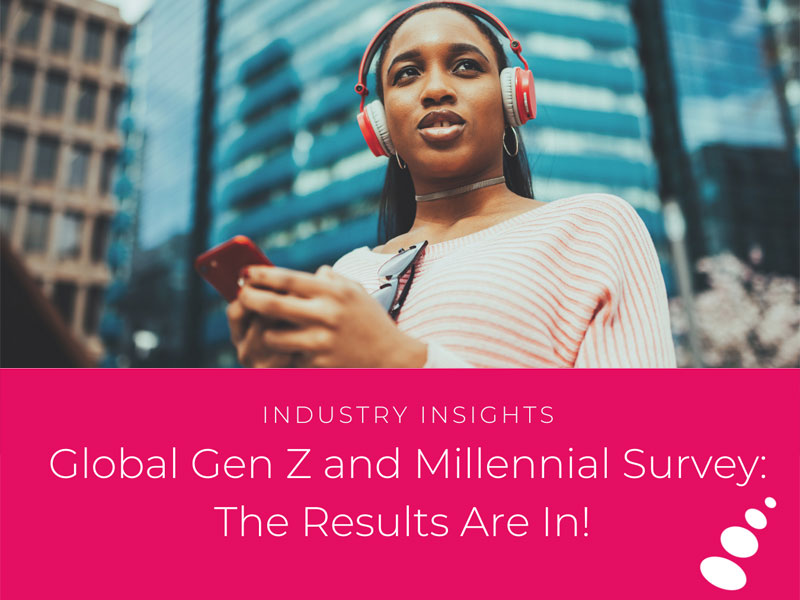
Global Gen Z and Millennial Survey: The Results Are In!
As I forged most of my early career in, well, Early Careers, I feel strongly about keeping in touch with different generational values and trends. Each year, Deloitte releases their Global Gen Z and Millennial Survey, and 2023’s edition unveils some eye-opening insights into the thoughts and feelings of these generations. A global survey across 44 countries saw 22,000 young people voice their thoughts on how they perceive “work” and the changing world they exist in. Here I have summarized some key takeaways, and what employers can be doing to support those early on in their careers
The Rise of Remote
The survey states that for Gen Z (49%) and millennials (62%), work holds a central place in their identity, but they’re passionate about maintaining a healthy work/life balance. The interest in part-time jobs is growing, and the idea of condensed four-day work weeks is gaining traction. Remote and hybrid work is highly valued, with many even open to changing jobs if asked to work on-site full-time. It would be remiss to not see the link here in a post Covid world, and as leaders we should trust our people to thrive just as much in their own environment as an office one.
Why should I work for you?
While satisfaction with work/life balance and Diversity, Equity and Inclusion progress has seen improvement, concerns about overall societal impact lingers. Gen Z and millennials have high expectations for employers, urging business leaders to actively address social and environmental issues. These concerns bleed into their own work as well, with many employees leaving roles and organisations due to a values misalignment, and not necessarily with a new role to go to.
Money, money, money!
High living costs top the list of societal concerns, with half of the respondent’s living paycheck to paycheck. Financial concerns extend to potential economic recessions impacting climate action, pay increases, flexibility, and job searches. Despite this, Gen Z holds a more optimistic view regarding personal financial improvement, although how long this will last, we don’t know. With the increasing cost of living, food costs and property prices, young people today are struggling to get ahead more than ever before.
Climate Change and Sustainability
Climate change is a major concern influencing decisions in family planning, consumption, and career choices. Financial constraints, however, might hinder sustainable efforts, leaving respondents uncertain about affording eco-friendly products in challenging economic situations. Gen Z and millennials are vocal about wanting greater climate action from employers and stress the importance of skills training for a low-carbon economy. As above, they are also more likely to leave an employer, or not join an organization that isn’t seen to “talk the talk” or “walk the walk” when it comes to sustainability.
The Big Burnout
With all this to factor in, high stress levels remain, fueled by financial concerns, workplace factors, and mental health. Burnout is on the rise, even though efforts to improve mental health at the workplace are acknowledged but underutilized. Mixed feelings about social media’s impact on mental health are prevalent among respondents.
How employers can keep moving forward?
To tackle the urgent need for businesses to address societal impact, financial concerns, and mental health issues for a more supportive and inclusive environment, employers and leaders must take proactive measures. It’s crucial to sustain momentum, especially in uncertain economic conditions. Companies dedicated to these concerns are likely to stand out in attracting and retaining top talent. However, persistent financial worries among Gen Zs and millennials make discussions about raises or promotions uncomfortable. Organizations bear the responsibility of ensuring financial well-being by providing competitive salaries, flexible benefits, and fair pay standards. Keeping communication channels regarding compensation clear and open is essential in fostering transparency and trust within the workforce.
In summary, these key insights into the evolving perspectives of the younger workforce worldwide, underscore the increasing importance of remote work, a strong desire for work/life balance, and the need for employers to address societal impact and environmental concerns. Persistent financial worries, exacerbated by high living costs, impact career decisions and contribute to burnout. As employers we urge you to proactively address these challenges to attract and retain top talent, emphasizing transparency and open communication, particularly regarding remuneration and reward.

Niamh is a Senior Recruiter with experience in both the UK and New Zealand. Originally from Manchester, UK she spent 8 years living and working in Auckland primarily within the Financial Services industry.

